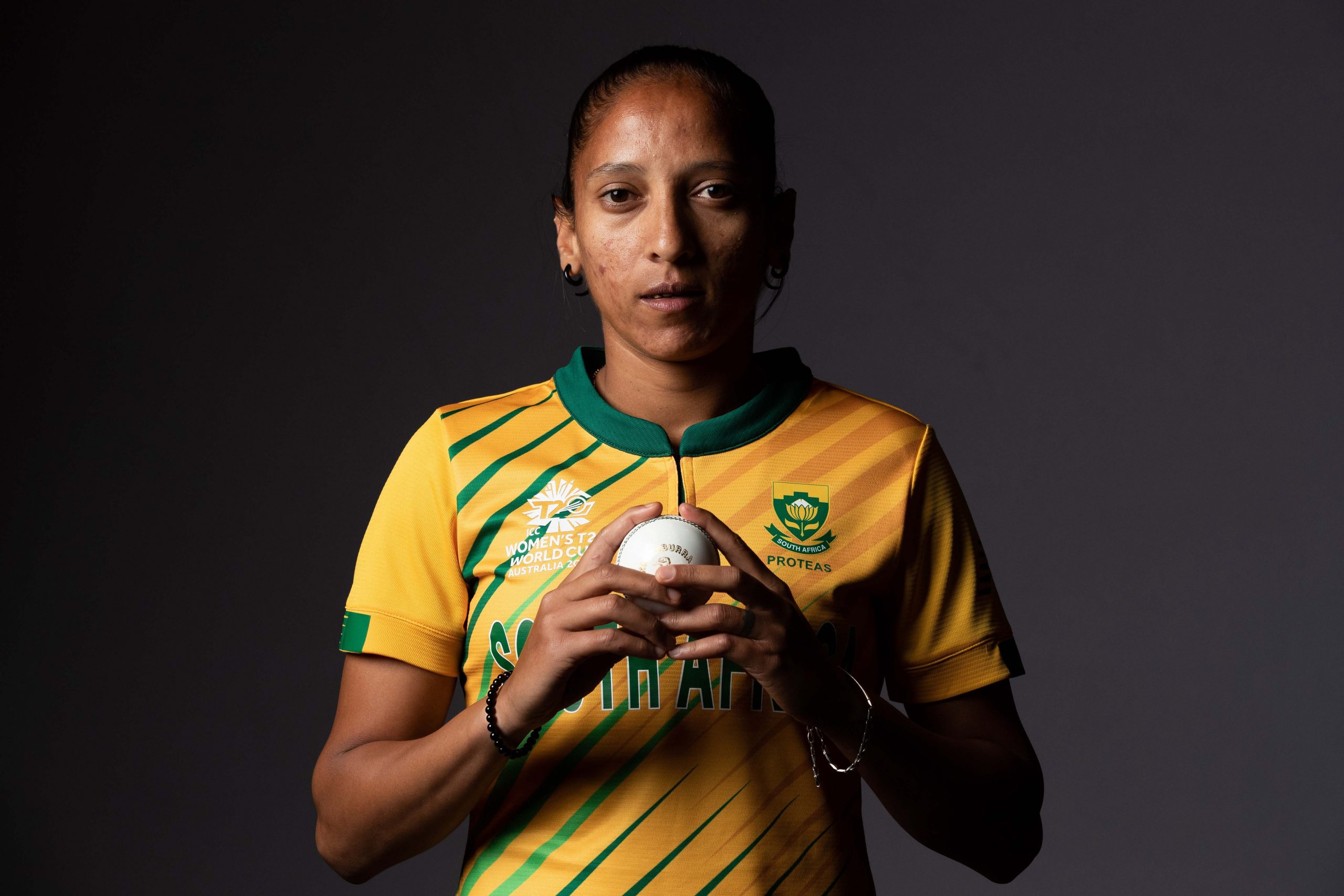Shabnim Ismail’s need for speed
The fastest woman on the planet doesn’t shriek when that tag is thrust on her. That’s why she is the most lethal South African bowler in Proteas Women’s history.
Author:
11 May 2020

Nothing screams “South African cricket” like the sight of a fast bowler galloping towards the wicket with wicked intent. Powerful legs like pistons. Bulging veins and manic eyes. Whipping arms like sjamboks coiling in anticipation of the carnage to follow.
Dale Steyn, arguably the greatest exponent of this primal art, once likened the fast bowler to the lead guitarist in a rock band. “If everyone could do it, they would,” he said. And that’s the truth. No matter how much training the ordinary human puts in, there are limits to how fast certain bodies can bowl.
South Africa’s other greats are behemoths: Allan Donald, Kagiso Rabada, Fanie de Villiers, Morne Morkel, Lungisani Ngidi, Shaun Pollock. These men tower over six feet. Smaller spearheads like Steyn and Makhaya Ntini are renowned athletes with demigod levels of stamina and immense willpower.
Shabnim Ismail is an outlier in everything but her prowess with the ball. Most obviously, she is a woman, and in the male-dominated world of top level cricket in South Africa, she does not get nearly as much credit as she deserves.
Secondly, and more importantly, she is tiny. She stands at 1.65m and, in her own words, “has hardly any meat on the bone”. That has not stopped her from bowling fast. Very fast. So fast that she has a claim to being the fastest woman on the planet. A claim she has no qualms making herself.
Related article:
“I do believe that when I’m firing, there is no one who can touch me,” Ismail told New Frame from her home in Roodepoort. “I’m driven by an intense desire to bowl faster than anyone else in the game. I walk the walk, I don’t just talk the talk.”
Representing the Melbourne Renegades during the 2016 Women’s Big Bash League (WWBL), the T20 franchise tournament in Australia, Ismail was clocked at 128km/h at the famous Melbourne Cricket Ground. Since then she has earned a reputation of knocking the world’s premier batters on the head, including India’s teenage sensation Shafali Verma, who copped a dented helmet in last year’s T20 series.
But she is no aimless missile. Like all pedigree pace bowlers she backs up her speed through the air with unnerving accuracy and just enough movement out the hand and off the deck.
Becoming ‘the demon’
She is South Africa’s highest wicket taker in both 50-over and 20-over cricket. Her 99 wickets at 18.65 from 92 T20Is places her fourth on the all-time list. Across 98 ODIs she has 113 scalps at 20.88, good enough for tenth on that particular historical chart.
So how has she done it? How has this pocket-sized puncher kept pace with the heavyweights of the game? If you’re here for answers, you’re out of luck.
“I have no clue,” she confesses. “All I’ve ever said is dynamite comes in small packages. Coaches, teammates, opposition players; they all ask me. I just shrug. It’s just something that I’ve just been able to do.”
Ismail is the youngest of seven children and was raised in Cravenby in the Parow Valley outside Cape Town. She never considered herself particularly sporty but honed what innate athleticism she had playing games with her older brothers.
Related article:
At the behest of her cricket-loving mother and late grandfather, she joined Primrose Cricket Club as a 16-year-old in 2004. She was given a bat but hated the idea of being dismissed. On several occasions she threatened to quit the game out of frustration. A coach convinced her to try her hand at bowling and she soon earned the nickname, “The Demon”.
“I didn’t take to it at first,” she says. “I was overthinking it. I tried to make my body move in this unnatural way. One day, someone told me to empty my head and think of it as a game. I was told to just run as fast as I could, to bowl as fast as I could and try hit those three sticks at the other end. It sounds simple but something clicked. It was just me and the ball. I was hooked.”
She made her senior debut for Western Province a year later as a 17-year-old, taking 15 wickets in her first season. Under the tutelage of Ashlyn Kilowan, who took 43 wickets for South Africa between 2003 and 2009, Ismail added guile to her grunt. Her tool kit came to include cutters and slower balls. Setting up a batter with a barrage of short balls before pushing one up became a hallmark.
In January 2007, she opened the bowling in her international debut as an 18-year-old, picking up two wickets in a comprehensive win over Pakistan in Pretoria. In 2013, Ismail was one of six players awarded full-time contracts in a landmark move from Cricket South Africa.
Sharing her skills with the next generation
It wasn’t all smooth sailing, however. A “crazy incident” saw her suspended from the national academy a year into her new life as a professional. Along with three other players, Ismail was found in breach of conduct and ordered to attend counselling for alleged alcohol abuse. As the only Muslim in the team, the public scandal was hard to stomach.
“It taught me that you can’t take anything for granted,” she says. “I don’t want to go into the details but I made a mistake and learned important lessons. I’m more humble now and appreciate the position I have. I don’t necessarily regret what happened because it has made me the person I am today. I want to use my platform for good.”
When she is not wearing the colours of her nation, Ismail coaches young girls. She has a sense of responsibility to help grow the women’s game and wants to pass on a legacy of fast bowling to future generations. To do this, she focuses on the abstract.
“Bowling fast requires a particular mindset,” she explains. “You have to want to do it. If you’re going to bowl a bouncer, then you must fucking bowl the meanest bouncer you’ve ever bowled. You’re the leader of the attack and you need to show it.”
Related article:
Ismail wears No. 89 on her back, the same number worn by Andre Nel who is a hero of hers. “I loved his aggression,” she says. “I love the way he was able to switch into beast mode.”
While on duty for the Sydney Thunder in last year’s WBBL, Ismail squared up against the Renegades who had their own alpha predator in their ranks. New Zealand’s Lea Tahuhu bowled with searing pace in the first innings, consistently north of 120km/h, as Sydney posted 132/8. Thunder head coach Trevor Griffin quipped that Tahuhu had probably put in the fastest spell of the competition. That was all the motivation Ismail needed.
She ripped through the Renegades with a player of the match 3/14 from four overs. Her fourth ball reached 125km/h and she never took her foot off the gas. “I told my coach that there was no one quicker than me, and I meant it,” she says, laughing.
Levelling the playing field
But Ismail is not content. She bemoans the inequality that exists in South Africa between genders and points to the good work done in Australia and England. In the WBBL as well as The Hundred in England, men and women players are given the same platform when it comes to advertising and promotion. Pay gaps still exist. “That’s the nature of economics,” she says. Ismail recently shared a billboard with Chris Morris in Sydney. This, she says, gave her a strong sense of unity.
“Would people even recognise us in the street in South Africa?” Ismail asks. “CSA have done a great amount of work but more can be done. The [Mzansi Super League] should have included a women’s edition. The two Proteas teams should mingle more, not just at sponsored events or award ceremonies. We’ve shown we deserve it.”
Related article:
The combination of Australia and rain halted the Proteas impressive T20 World Cup campaign at the semifinal stage in March. It is a familiar story but that performance – which Ismail is adamant would have ended differently had the weather played ball – and a first-ever tournament victory over England, did indeed underline the great strides the team has made. Ismail would like to see that performance reciprocated by fans, journalists and corporate sponsors.
“Back us,” she implores. “But also acknowledge that we’re different. Men don’t get periods. Men don’t have to choose between having children and playing. We have our own challenges and we play a different style of cricket. But we are just as passionate and patriotic. We’ve shown we can win a World Cup.”
Next time you compile a list of the pantheon of great South African fast bowlers, be sure to make room for this diminutive demon.




